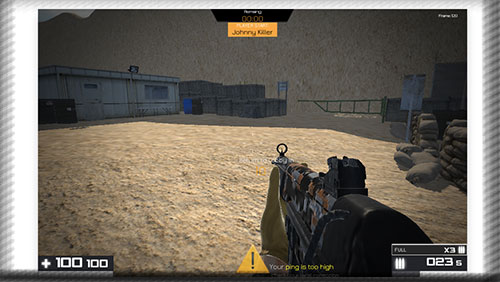Esports and skill-based game developer Gaimerz has created a networked P2P gaming solution called Desert Warfare inspired by the online poker network model.
 Who hasn’t played video games as a kid and had a side bet with a friend over the winner? It began with betting Penguin chocolate bars on who could cross the most rivers playing Frogger, and it continues, today, thanks to the companies like Gaimerz.
Who hasn’t played video games as a kid and had a side bet with a friend over the winner? It began with betting Penguin chocolate bars on who could cross the most rivers playing Frogger, and it continues, today, thanks to the companies like Gaimerz.
With the youth of today, comparing the sense of putting your money into a slot machine and pressing a button with smoking cigarettes, companies like Gaimerz have entered the space to create skill-based games to replace the old rope.
The esports and skill-game developer has recently launched their first networked P2P gaming solution, an objective-based multiplayer first-person shooter (FPS) called Desert Warfare.
“Taking inspiration from popular FPS titles Counter-Strike: Global Offensive (CS: GO) and CrossFire, Desert Warfare allows players to battle it out directly against each other with multiple weapons on a range of immersive maps for cash prizes, social points, or league position,” said co-founder Matt Denney. “Players access the game environment via a central lobby front-end where information concerning the objectives, prize and entry requirements are clearly stated.”
The solution, integrated entirely via API, allows operators to create their own unique front-end game lobby user interfaces which simultaneously offers access to pooled liquidity and private operator-only match rooms.
“Simply put, Gaimerz provides all the data necessary for clients to create a game lobby from which players can view, access and compete in a variety of match rooms,” explains Denney. “Every lobby can link up to a broader player network by configuring the solution to show “networked games”. In this scenario, Gaimerz will populate the client’s lobby with specific match-rooms which are accessible from any participating operator.”
Networking makes sense. It increases liquidity, and strength of competition. Gaimerz went even further, by allowing operators to create sub-networks.
Denney explains:
“For those operating multiple sites or properties, the Gaimerz solution facilitates sub-networks, granting a host the opportunity to control match rooms, entry fees (social points or real money) and game objectives similarly to how Gaimerz controls the overarching network’s match-rooms. This feature enables operators to create their own unique network ecology and build gaming contests and features which suit business objectives.”
Denney promises his punters that Desert Warfare brings ‘relative player skill to the fore.’ Match room operators will also have the ability to tweak the rules giving punters, even more, variety when it comes to game options via the front end lobby.
Denny’s idea for the networking capability of Desert Warfare came from online poker, and he is hoping that online poker players denied the opport unity to play their beloved game due to airhead government officials would turn to games like Desert Warfare.
unity to play their beloved game due to airhead government officials would turn to games like Desert Warfare.
“Higher potential prize pools and the ability to enter matches quickly represented key aspects from the online poker world which had applicability equally in P2P video gaming,” confirmed Denney. “P2P video gaming contests are entirely skill based and as a company Gaimerz is keen to ensure that we can link up players from key global markets which have been inaccessible for online poker given the seemingly eternal skill v chance debate.”
Gaimerz has already secured three deals with partners ready to join the network, but for the moment their names will remain a secret.
If you want to learn more about Desert Warfare or demo the game, then contact [email protected].





